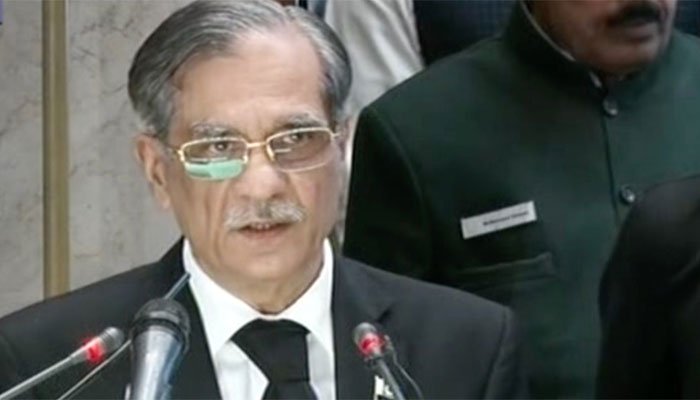Worked for rights of the oppressed, CJP address to full court reference

ISLAMABAD (92 News) – Chief Justice of Pakistan Mian Saqib Nisar said that he had worked for the rights of the oppressed and gave vote right to overseas Pakistanis.
Addressing the full court reference held in his honour on Thursday, he said that the Supreme Court had announced landmark verdicts.
“As the chief justice, I took a notice of water scarcity and raised the issue of an increase in population,” he said.
The CJP said that he had given each citizen the right to live respectfully. “I took notice of fee charged by private hospitals. I also took notice for issuance of CNICs to eunuchs. In addition, I also took notice of house maids, including Tayyaba,” he said.
Speaking on the occasion, Justice Asif Saeed Khosa said that as the chief justice, he would try to remove impasse in the provision of justice. “All institutions should jointly work for the progress in the country,” he said.
Paying tribute to the outgoing chief justice, he said that CJP Saqib Nisar had run the court in difficult time.
“We grew together, became the LHC judge together and now we are parting. I and all judges will feel the absence of Chief Justice Mian Saqib Nisar. His services for human rights will be remembered forever,” he said.
He said that he also wants to make the dam and would make the dam against cases lying pending in subordinate courts. “There is need to discuss the charter of governance under President Dr Arif Alvi. There is need to activate all state institutions for democratic stability,” he said.
Sixteen judges, out of total 17, participated in the full court reference. However, Justice Mansoor Ali Khan did not attend the reference.
Chief Justice Mian Saqib Nisar heard several important cases. The cases, including Nawaz Sharif’s disqualification, fake accounts, dual nationality, ground water, use of official vehicles, population growth, lawyers’ fake degrees, removal of bill boards, Zainab murder, reduction in school fee, APS Inquiry Commission, Naqeebullah murder and food shortage in Thar were highlighted in the media.
He formed a bench on the Panama Leaks. During his tenure, he heard 29 suo-motu notices. The first suo motu he took was the Shahzeb murder case.
Justice Nisar started his judicial career on May 22, 1998 when he was elevated as a judge of the Lahore High Court. Later, he took oath under the provisional constitutional order (PCO) in 2000 after a military coup but refused to take oath on the PCO of November, 2007.
On February 18, 2010, he was elevated to the Supreme Court and took oath as the CJP on December 3, 2016. His career as an SC judge can be divided into different phases.
Justice Nisar’s elevation to the SC was a dramatic one. The Pakistan People’s Party (PPP) led government had appointed him as the LHC chief justice and elevated Khawaja Sharif in the apex court without consent of the former CJP Iftikhar Chaudhry.
However, Justice Nisar refused to become the LHC chief justice. Subsequently, the PPP government withdrew its decision and directly elevated him to the SC with consent of the CJP. During Justice Iftikhar era (2009-13), when the judiciary was assuming powers of all other institutions, Justice Nisar had raised a voice of dissent.







